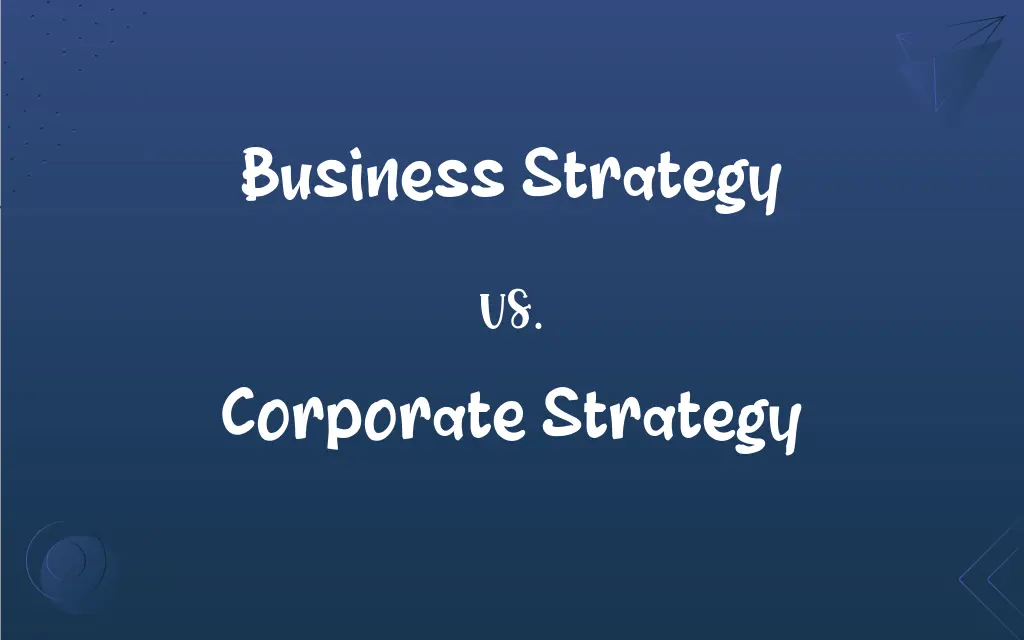Business Strategy vs. Corporate Strategy: What's the Difference?
Edited by Aimie Carlson || By Janet White || Updated on November 11, 2023
Business Strategy focuses on competitive advantage within a specific market, while Corporate Strategy centers on the overall scope and direction of a corporation and its various businesses.

Key Differences
Business Strategy is a roadmap that a company employs to outperform its competitors in a particular market or industry. This strategy revolves around creating a unique value proposition for its offerings. Corporate Strategy, on the other hand, concerns the overall plan for a diversified company, guiding which industries or markets the corporation should invest in.
The objective of Business Strategy is to ensure that a company achieves and maintains a competitive edge in its chosen market. It pinpoints the target customer base, aligns the company's resources, and positions the brand effectively against competitors. Conversely, Corporate Strategy takes a bird's eye view, deciding how a conglomerate should manage its portfolio of businesses for maximum value.
For firms operating in a single industry or market, Business Strategy will often be the primary focus. This strategy will delineate how a company plans to tackle competition, manage its resources, and meet customer demands. Corporate Strategy becomes crucial when companies diversify, as it determines how to allocate resources across multiple lines of business and identifies potential synergies.
Business Strategy is typically detailed, delving into the nuances of market positioning, product development, and operational efficiencies. It is the tactical game plan for one specific battlefield. In contrast, Corporate Strategy remains broader, charting the course for the entire fleet of a corporation's businesses, ensuring that each complements and reinforces the others.
Comparison Chart
Focus
Competitive advantage in a specific market
Overall direction of a corporation
ADVERTISEMENT
Scope
Single market or industry
Multiple markets or industries
Objective
Achieving market leadership
Maximizing overall corporate value
Level of Detail
Detailed and tactical
Broader and strategic
Main Concern
Product, market competition, customers
Portfolio management, resource allocation
Business Strategy and Corporate Strategy Definitions
Business Strategy
A plan focused on achieving a competitive position in a specific market.
Our Business Strategy targets the luxury segment, differentiating us from mass-market brands.
ADVERTISEMENT
Corporate Strategy
The overarching strategy focusing on a company's structural decisions and resource allocations.
Investing in renewable energy forms a pivotal part of our Corporate Strategy for sustainable growth.
Business Strategy
An approach detailing how a company will achieve its objectives within its industry.
Implementing an aggressive marketing campaign is central to our Business Strategy.
Corporate Strategy
A blueprint for optimizing a corporation's overall value and synergies.
Acquisitions of tech startups are central to our Corporate Strategy for digital transformation.
Business Strategy
The roadmap for how a firm will compete, use its resources, and meet market demands.
Our Business Strategy emphasizes innovation to stay ahead of rivals.
Corporate Strategy
A strategy determining the mix and relationships of business units within a corporation.
Our Corporate Strategy emphasizes cross-collaboration between our health and tech divisions.
Business Strategy
A tactical plan for outperforming competitors in a given market segment.
By focusing on customer service, our Business Strategy has garnered a loyal clientele.
Corporate Strategy
A high-level plan guiding the overall direction and scope of a diversified corporation.
Our Corporate Strategy involves expanding into Asian markets to tap emerging opportunities.
Business Strategy
The methodology a company adopts to deliver value in its chosen field.
Sustainable sourcing is a cornerstone of our Business Strategy, attracting eco-conscious customers.
Corporate Strategy
The approach defining how a corporation manages its portfolio of businesses.
As part of our Corporate Strategy, we are divesting non-core subsidiaries.
FAQs
Why is Corporate Strategy crucial for conglomerates?
Corporate Strategy guides conglomerates on resource allocation, portfolio management, and synergistic opportunities across businesses.
What is Business Strategy's primary focus?
Business Strategy focuses on achieving a competitive position within a specific market.
Is Business Strategy more detailed than Corporate Strategy?
Typically, Business Strategy is more detailed and tactical, focusing on a specific market, while Corporate Strategy is broader.
How does Corporate Strategy differ from Business Strategy?
Corporate Strategy pertains to the overall direction and scope of a diversified corporation, whereas Business Strategy is market-specific.
Can Corporate Strategy influence Business Strategy?
Yes, the overarching goals set by Corporate Strategy can guide the formation of individual Business Strategies.
Can a company have both Business Strategy and Corporate Strategy?
Yes, especially if the company operates in multiple markets or industries.
Is market research more relevant to Business Strategy?
Yes, market research directly informs Business Strategy to understand customer preferences and competitive landscapes.
Which strategy deals with competition?
Business Strategy primarily addresses competition within a specific market.
Does every company need a Business Strategy?
Yes, every company, regardless of size, benefits from a Business Strategy to navigate its specific market.
Is Business Strategy concerned with a company's product or service?
Yes, Business Strategy deeply involves product positioning, development, and meeting market demands.
Which strategy involves deciding on mergers and acquisitions?
Corporate Strategy often deals with decisions regarding mergers, acquisitions, and divestitures.
How frequently should a Business Strategy be revised?
Business Strategy should be revisited regularly, especially in rapidly changing markets, to remain competitive.
Is risk management part of Corporate Strategy?
Yes, Corporate Strategy often involves assessing and managing risks at the organizational level.
Which strategy addresses customer needs and preferences?
Business Strategy directly addresses customer needs, preferences, and market demands.
Who typically formulates Corporate Strategy in a company?
Corporate Strategy is usually crafted by top executives and the board of directors.
Can a successful Business Strategy ensure corporate success?
While a robust Business Strategy can lead to success in a market, overall corporate success may require a sound Corporate Strategy, especially in diversified firms.
Why might a company revisit its Corporate Strategy?
Companies might reevaluate their Corporate Strategy due to changes in the external environment, industry shifts, or to leverage new opportunities.
Does Corporate Strategy delve into day-to-day operations?
No, Corporate Strategy is more about high-level, long-term direction rather than daily operations.
How does Corporate Strategy view profitability?
Corporate Strategy seeks profitability across the entire corporation, optimizing the mix and relationships of its businesses.
Can a change in Business Strategy impact a company's brand?
Yes, shifts in Business Strategy can influence brand perception, positioning, and customer relationships.
About Author
Written by
Janet WhiteJanet White has been an esteemed writer and blogger for Difference Wiki. Holding a Master's degree in Science and Medical Journalism from the prestigious Boston University, she has consistently demonstrated her expertise and passion for her field. When she's not immersed in her work, Janet relishes her time exercising, delving into a good book, and cherishing moments with friends and family.
Edited by
Aimie CarlsonAimie Carlson, holding a master's degree in English literature, is a fervent English language enthusiast. She lends her writing talents to Difference Wiki, a prominent website that specializes in comparisons, offering readers insightful analyses that both captivate and inform.






































































